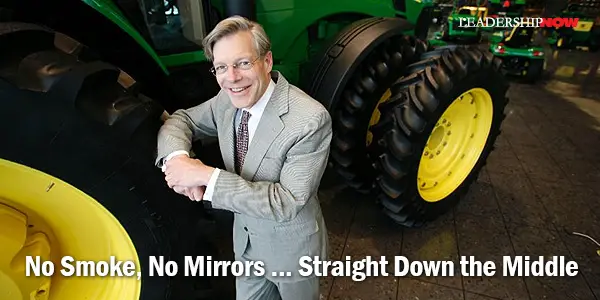No Smoke‚ No Mirrors ... Straight Down the Middle
 R
ROBERT W. LANE, the former “chief steward” (as he referred to himself) of the 169-year-old
John Deere Company, shared a few thoughts on integrity to the students at the Mendoza School of Business of the University of Notre Dame.
First, it is probably best to define what I mean when I say “integrity.” It means: “No smoke‚ no mirrors, no tricks … straight down the middle.” It means no exaggerations, no dissembling; just the “real deal.”
The John Deere way of describing integrity—“No smoke, no mirrors, no tricks … straight down the middle”—doesn’t apply only to customers, shareholders or employees. The phrase applies to how we work with our dealers, communities, suppliers, legislators, non-governmental organizations, industry associations, universities and research groups. The good thing about acting with integrity is that you can present a consistent face to all of your key audiences.
Many of you have some corporate experience. You have tested yourselves on the field of competition. You know the critical importance of passion, commitment, teamwork, perseverance, and imagination. But without integrity—that moral compass to do what is right, not just what is expedient—these important traits lack a “bonding agent.” They require integrity to make them truly adhere to business goals.
Recent scandals at major corporations around the world make it easy to see what can go wrong if leaders act out of mere short-term self-interest rather than principled, long-term self-interest, which then contributes to the greater good... Frankly, these recent situations are very disappointing.
In part, they are disappointing because the public is losing faith in business—when in fact it is business that can help lift and keep people out of poverty by providing good jobs as well as the continuous training required to keep employees’ skills and capabilities abreast with changing needs. It is business, through its taxes, that can help communities, even nations, build infrastructure and educate their populations. It is business, working with public officials, that can help create public policy that advances the human condition. But without people who believe in them, i.e., investors, employees, and legislators, businesses are hard-pressed to make the investments they need to build and grow. The ramifications of recent indiscretions and willful misdeeds run deep and hurt us all.
According to University of Chicago economics professors Rajan and Zingales, the public and its beliefs matter. In their book, Saving Capitalism from the Capitalists, they point to the anti-market reaction during the Great Depression, noting it “was made possible because the public was all too willing to believe that the market was fatally flawed.” What will happen to today’s free market systems if the public broadly believes the same thing?
Now is the time for Saving Capitalism from the Capitalists, as Rajan and Zingales suggest in their book title. These authors believe that, and I quote: “The greatest danger for the market democracy today is … suppressing competition under the excuse of reducing risk.” They recognize a role for government in developing appropriate infrastructure that allows markets to work efficiently. They caution against a hands-off policy that ultimately could limit access to a privileged few.
If the response to scandals becomes a set of increased regulatory restraints, businesses can be put at a distinct disadvantage. An already fragile free-market system becomes even more vulnerable. Rajan and Zingales caution, as do I, that today all businesses should pay much greater heed to the delicate balance of the free market/regulatory environment, be eternally vigilant against complacency and “closed clubs,” and carefully work to build greater trust, transparency and expanded competition.
We must bend over backward to ensure we not only say the right things, but we do the right things.
Somehow, word needs to get out that many companies are well run by people with high integrity. But don’t just take this statement from me as gospel. People just like you need to question people like me. Learn what you can about individual companies—how they are managed, their behaviors and results. Find out for yourself that the state of business is not as bleak as some would have you believe. That kind of inquisitive and demanding mindset can help to further restore faith in the world of business.
If we have a “fine sense of our obligations,” business can—as it delivers long-term, sustained performance—contribute to human flourishing. If we do what we say we will do—no smoke, no mirrors, no tricks … straight down the middle—we can help restore faith in free markets. If we act out of principled, long-term self-interest rather than mere short-term self-interest, we can contribute to the greater good and we can all leave the world better for our being here than when we entered it.
* * *

Like us on
Instagram and
Facebook for additional leadership and personal development ideas.
Posted by Michael McKinney at 09:30 AM
Permalink
| Comments (0)
| This post is about Ethics









